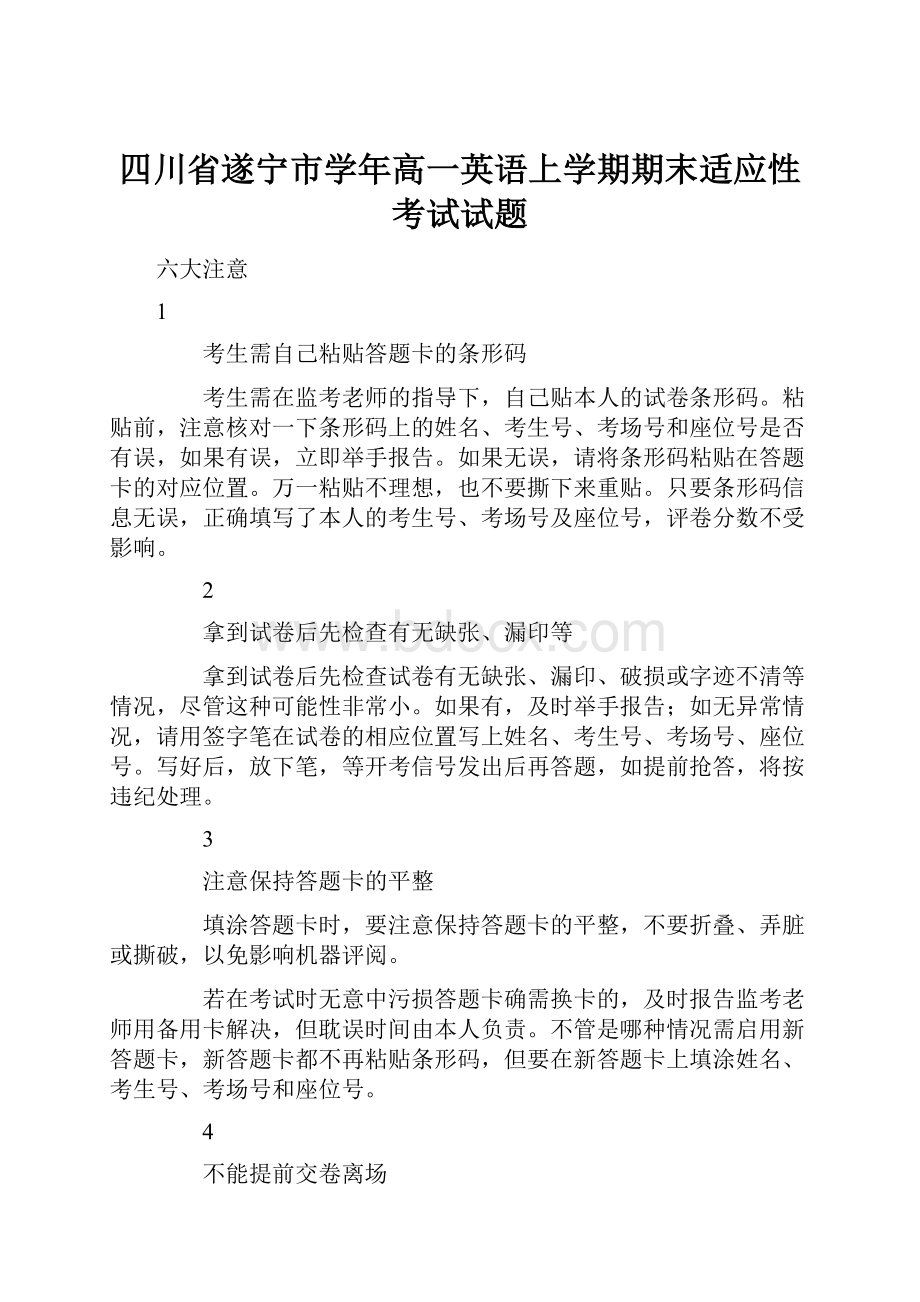四川省遂宁市学年高一英语上学期期末适应性考试试题.docx
《四川省遂宁市学年高一英语上学期期末适应性考试试题.docx》由会员分享,可在线阅读,更多相关《四川省遂宁市学年高一英语上学期期末适应性考试试题.docx(14页珍藏版)》请在冰豆网上搜索。

四川省遂宁市学年高一英语上学期期末适应性考试试题
六大注意
1
考生需自己粘贴答题卡的条形码
考生需在监考老师的指导下,自己贴本人的试卷条形码。
粘贴前,注意核对一下条形码上的姓名、考生号、考场号和座位号是否有误,如果有误,立即举手报告。
如果无误,请将条形码粘贴在答题卡的对应位置。
万一粘贴不理想,也不要撕下来重贴。
只要条形码信息无误,正确填写了本人的考生号、考场号及座位号,评卷分数不受影响。
2
拿到试卷后先检查有无缺张、漏印等
拿到试卷后先检查试卷有无缺张、漏印、破损或字迹不清等情况,尽管这种可能性非常小。
如果有,及时举手报告;如无异常情况,请用签字笔在试卷的相应位置写上姓名、考生号、考场号、座位号。
写好后,放下笔,等开考信号发出后再答题,如提前抢答,将按违纪处理。
3
注意保持答题卡的平整
填涂答题卡时,要注意保持答题卡的平整,不要折叠、弄脏或撕破,以免影响机器评阅。
若在考试时无意中污损答题卡确需换卡的,及时报告监考老师用备用卡解决,但耽误时间由本人负责。
不管是哪种情况需启用新答题卡,新答题卡都不再粘贴条形码,但要在新答题卡上填涂姓名、考生号、考场号和座位号。
4
不能提前交卷离场
按照规定,在考试结束前,不允许考生交卷离场。
如考生确因患病等原因无法坚持到考试结束,由监考老师报告主考,由主考根据情况按有关规定处理。
5
不要把文具带出考场
考试结束,停止答题,把试卷整理好。
然后将答题卡放在最上面,接着是试卷、草稿纸。
不得把答题卡、试卷、草稿纸带出考场,试卷全部收齐后才能离场。
请把文具整理好,放在座次标签旁以便后面考试使用,不得把文具带走。
6
外语听力有试听环
外语考试14:
40入场完毕,听力采用CD播放。
14:
50开始听力试听,试听结束时,会有“试听到此结束”的提示。
听力部分考试结束时,将会有“听力部分到此结束”的提示。
听力部分结束后,考生可以开始做其他部分试题。
四川省遂宁市2019-2020学年高一英语上学期期末适应性考试试题
第I卷(选择题,共75分)
第一部分听力(共两节,满分20分)
第一节(共5小题;每小题1分,满分5分)
听下面5段对话。
每段对话后有一个小题,从题中所给的A、B、C三个选项中选出最佳选项,并标在试卷的相应位置。
听完每段对话后,你都有10秒钟的时间来回答有关小题和阅读下一小题。
每段对话仅读一遍。
例:
Howmuchistheshirt?
A.£19.15.B.£9.18.C.£9.15.答案是C。
1.Whataretheycomplainingaboutthemeal?
A.Thetaste.B.Thesize.C.Theservice.
2.WhatisMarydoingnow?
A.Studyingatschool.B.Takinganexam.C.Havingagoodtime.
3.Whenisthemanreallyfree?
A.Weekdays.B.Sunday.C.Saturday.
4.Wherearethespeakers?
A.Inabookstore.B.Inaclassroom.C.Inalibrary.
5.Whatiswrongwiththeman?
A.Hehasanupsetstomach.B.Hecan'tfindatoilet.C.Hehasafever.
第二节(共15小题;每小题1分,满分15分)
听下面5段对话或独白。
每段对话或独白后有几个小题,从题中所给的A、B、C三个选项中选出最佳选项,并标在试卷的相应位置。
听每段对话或独白前,你将有时间阅读各个小题,每小题5秒钟;听完后,各小题将给出5秒钟的作答时间。
每段对话或独白读两遍。
听下面一段对话,回答第6和第7两个小题。
6.WhoisBetty?
A.Theman’sdaughter.B.Joan’sclassmate.C.Thewoman’scousin.
7.WhatwillBettydo?
A.AttendJoan'sparty.B.StudyinAmerica.C.Visitthewoman.
听下面一段对话,回答第8至第10三个小题。
8.Wheredoestheconversationprobablytakeplace?
A.Ataconcert.B.Atthebusstop.C.Inataxi.
9.Whataretheytalkingabout?
A.Whattheconcertisabout.B.Wheretospendthenight
C.Howtogethome.
10.HowwillSaragohome?
A.Bycar.B.Bytaxi.C.Onfoot.
听下面一段对话,回答第11至第13三个小题。
11.Whatseemstobethewoman'sproblem?
A.Shecan'tgetalongwithherclassmates.
B.Shedoesn'thaveenoughtimetostudy.
C.Shedoesn'thaveagoodfriend.
12.Whatdoesthewomanhavetodofirstaccordingtotheman?
A.Beconfident.B.Talktoothersfrequently.C.Helpothers.
13.Howdoesthewomanfeelatlast?
A.Confused.B.Relieved.C.Worried.
听下面一段对话,回答第14至第17四个小题。
14.Whatisthemandoingnow?
A.Havingaholiday.B.Cleaningtheroom.C.Makingacomplaint.
15.Whatdoesthemansayaboutthehotel?
A.Theroomwasdirty.
B.Thefoodwasdelicious.
C.Itwasveryquietatnight.
16.Whatdoweknowaboutthecleaners?
A.Theywereoffwork.B.Theyrefusedtowork.C.Theywerefired.
17.Whatdoesthemandecidetodofinally?
A.Acceptthediscount.B.Seethemanager.C.Movetoanotherhotel.
听下面一段独白,回答第18至第20三个小题。
18.Whatdidthespeakerchoosetheschoolfor?
A.Theadvancedfacilities.B.Thewell-trainedteachers.
C.AbetterchancetogotoAuniversity.
19.Whatpercentageofthestudentsaregirls?
A.Aboutonethird.B.Abouttwothirds.C.Aboutthreefourths.
20.Whatdoesthespeakerdislike?
A.Theenvironment.B.Theoldcomputers.C.Toomuchhomework.
第二部分 阅读理解(共两节,满分40分)
第一节(共15小题;每小题2分,共30分)
阅读下列短文,从每题所给的四个选项(A、B、C、D)中,选出最佳选项,并在答题卡上将该项涂黑。
A
The1900House
TheBowlerfamilywasoneofmorethan400familieswhoappliedto1900House,arealityTVshowwhichtookatypicalfamilybackahundredyearstoseehowpeoplelivedinthedaysbeforetheinternet,computergamesandevenelectricity.
TheBowlerfamilyspentthreemonthsinaLondonhomewithoutatelephone,computers,TV,orfastfood.TheBowlersworeclothesfrom1900,ateonlyfoodavailableinEnglishatthattime,andcookedtheirmealsonasinglestove.PaulBowlerstillwenttoworkeverydayinathenuniform.Thechildrenchangedtheirclothesonthewaytoandfromschoolandtheirclassmatesdidn’tknowabouttheirunusualhomelife.Joycestayedathome,cookingandcleaninglikeatypicalhousewifeofthetime,thougheverythingtookthreetimesaslong.
SodoesJoycethinkthatpeople’sliveswerebetterintheolddays?
“Ithinkpeopleintheolddayshadjustasmanytroublesandworries,”Joycesaid.AndIdon’tthinktheirlifewasbetterorworse,therewerelotsofthingsbackthenthat I’mhappyIdon’thavetodealwithnowadays,butontheotherhandlifewassimpler.”“Wehadalotmoretimewithourfamily,anditwashardbeingnicetoeachotherallthetime,”eleven-year-oldHilarysaid.
SowhatdidtheBowlerfamilymissmostaboutmodernlifewhilelivinginthe1900house?
Paul,39:
“telephoneandahotshower”
Joyce,44:
“aquickcupofteafromakettleyoucouldjustturnon”
Hilary,11:
“rockCD”
Joseph,9:
“hamburgerandcomputergames”
21.Whatdoestheshowwanttopresenttoitsviewers?
A.Thegoodolddays.
B.Howpeoplelivedinthepast.
C.Womendoingmostofthehousework.
D.Kidslearningbetterwithoutcomputers
22.WhatdidPaulhavetodofortheshow?
A.GetdresseddifferentlyB.Stayhomefromwork
C.Sendthechildrentoschool.D.Cookedonasinglestove.
23.AccordingtoParagraph4,what’sJoyce’sopinionaboutlifein1900?
A.Therewerefewerproblemsforthefamily
B.Lifewassimplerbutworsethanitisnow
C.Therewerethingsshelikedanddisliked
D.Thefamilyhadmoretimetostaytogether
24.Whatwouldthekidslikemosttohaveinthosethreemonths?
A.Moretimewiththeirparents
B.Time-savingequipmentinthekitchen.
C.Easywaytocommunicatewithothers
D.Fastfoodandentertainment
25.Whatcanbeinferredfromthispassage?
A.Thechildren’sschoolhadnoideawhatwasgoingoninthefamily.
B.Theolderwayoflifeismoreattractivetoadultsthantochildren.
C.Themodernconveniencesavemoretimeforfamilyget-together.
D.Notmanyfamiliesareinterestedinjoininginthisrealityshow.
B
It’snoteasybeingateenager---norisiteasybeingtheparentofateenager.Youcanmakeyourchildfeel angry,hurtormisunderstoodbywhatyousaywithoutrealizingityourself.Itisimportanttogiveyourchildthespaceheneedstogrowwhilegentlylettinghimknowthatyou’llstillbethereforhimwhenheneedsyou.
Expectalotfromyourchild,justnoteverything.Exceptforhealthandsafetyproblems,suchasdruguse orcarelessdriving,considereverythingelseopentodiscussion.Ifyourchildisunwillingtodiscusssomething,don’tinsistheshouldtellyouwhat’sonhismind.Themoreyouinsist,themorelikelythathe’llclamup. Instead,lethimattempttosolvethingsbyhimself.Atthesametime,remindhimthatyou’realwaystherefor him,shouldhelookforadviceorhelp.Showrespectforyourteenager’sprivacy.Neverreadhismailorlistentopersonalconversations.
Teachyourteenagerthatthefamilyphoneisforthewholefamily.Ifyourchildtalksonthefamily’s telephonefortoolong,tellhimhecantalkforl5minutes,butthenhemuststayoffthephoneforatleastan equalperiodoftime.Thisnotonlyfreesupthelinesothatotherfamilymemberscanmakeandreceivecalls, butteachesyourteenagermoderation(节制).Orifyouareopentotheidea,allowyourteenagerhisown phonethathepaysforwithhisownpocketmoneyorapart-timejob.
26.Whatisthistextmainlyabout?
A.Schooling.B.Parenting.C.House-keepingD.Friend-making
27.Inthe2ndparagraph,parentsareadvisedtodomoreifteenagers______.
A.havetroublewiththeirfriendsB.performbadlyintests
C.keepthingstothemselvesD.begintosmoke
28.Whatdoesthephrase"clamup"inParagraph2probablymean?
A.becomeexcitedB.showrespect
C.refusetotalkD.seekhelp
29.Bylimitingtheirphoningtime,thechildrenareexpectedtolearnto_____.
A.haveothersinmindB.bethebestofthemselves
C.spendmoretimetostudy D.communicateface-to-face
30.What’sthemessageforparentsfromthistext?
A.Watchtheirchildrencloselyallthetime.
B.Leavetheirchildrencompletelyalone.
C.Givetheirchildrenenoughfreedom.
D.Worktogetherwiththeschool.
C
TheiPhone,theiPad:
eachofApple’sproductssoundscoolandhasbecomeafashion.Applehascleverlytakenadvantageofthepoweroftheletter“i”---andmanyotherbrandsarefollowingsuit.TheBBC’siPlayer---whichallowsWebuserstowatchTVprogramsontheInternet---usedthetitlein2008.Alovelybear---popularintheUSandUK---thatplaysmusicandvideoiscalled“iTeddy”.Aslimmed-downversion(简装本)ofLondon’sIndependentnewspaperwasstartedlastweekunderthename“i”.
Ingeneral,single-letterprefixes(前缀)havebeenpopularsincethe1990s,whentermslikee-mailfirstcameintouse.
Most“i”productsareaimedatyoungpeopleandconsideringthemajorreadersofindependent’s“i”,it’snosurprisethatthey’veselectedthisfashionablename.
Butit’shardtoseewhat’ssospecialabouttheletter“i”.Whynotuse“a”,“b”,or“c”instead?
AccordingtoTonyThorne,headoftheLanguageCenteratKing’sCollege,London,“i”worksbecauseitsmeaninghasbecomeambiguous.WhenAppleuses“i”,nooneknowswhetheritmeansInternet,information,individualorinteractive,ThornetoldBBCMagazines.“EvenwhenApplecreatedtheiPod,itseemsitdidn’thaveonecleardefinition(定义),”hesays.
“However,thankstoApple,thetermisnowconnectedwithportability(轻便).”addsThorne.
※Clearlytheletter“i”alsoagreeswiththeideathattheWesternWorldiscenteredonthe